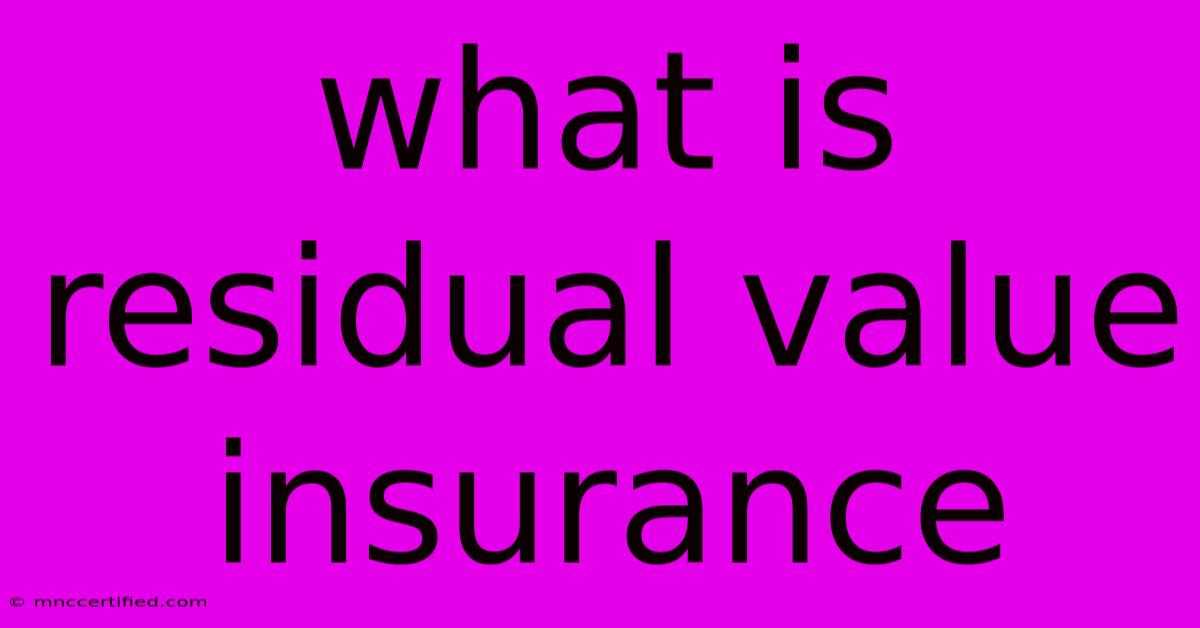What Is Residual Value Insurance

Table of Contents
What is Residual Value Insurance? Protecting Your Investment at the End of the Lease
Residual value insurance, sometimes called Guaranteed Asset Protection (GAP) insurance, is a crucial financial safeguard for individuals leasing or financing vehicles. It bridges the gap between what you owe on your vehicle loan or lease and its actual market value at the end of the term. Understanding this insurance is vital to preventing unexpected financial burdens.
Understanding the Risk: Why You Need Residual Value Insurance
When you lease a car, you're essentially renting it for a set period. At the end of the lease, you typically have three options: return the vehicle, purchase it, or extend the lease. The problem arises when the vehicle's market value is lower than the agreed-upon residual value (the value the leasing company expects the car to be worth at the end of the lease). This discrepancy is where residual value insurance steps in.
Let's illustrate with an example: You lease a car with a residual value of $15,000. However, after three years, the car's market value is only $12,000 due to depreciation, damage, or market fluctuations. Without residual value insurance, you'd be responsible for the remaining $3,000. This can be a significant unexpected cost.
Similarly, if you're financing a car and it's totaled in an accident, your insurance might only cover the current market value, leaving you owing the lender the difference. Residual value insurance can help cover this shortfall.
How Residual Value Insurance Works
Residual value insurance acts as a safety net. If the vehicle's market value falls short of the agreed-upon residual value, the insurance policy covers the difference. This means you won't have to pay out of pocket for this shortfall, protecting your financial stability.
Key features often include:
- Coverage for lease-end shortfalls: This is the primary function, covering the difference between the market value and the residual value at the end of the lease.
- Coverage for vehicle damage: Some policies extend coverage to instances where the vehicle is damaged or totaled before the lease ends, ensuring you're protected against significant financial losses.
- Flexibility in policy terms: Policies are tailored to the length of your lease or loan, providing protection for the entire duration.
Who Should Consider Residual Value Insurance?
While not mandatory, residual value insurance is highly recommended for several groups:
- Leaseholders: Leaseholders are particularly vulnerable to residual value discrepancies, making this insurance a prudent investment.
- High-depreciation vehicles: Cars that depreciate rapidly are at greater risk of having a lower market value than their residual value at the end of the lease.
- Individuals with limited financial buffers: Those with less financial flexibility should strongly consider this insurance to avoid unexpected expenses.
- Vehicle loan borrowers: If your vehicle is damaged or totaled before you pay off the loan, this insurance will cover the loan balance above the vehicle's current market value.
Choosing the Right Residual Value Insurance Policy
Several factors influence the cost and coverage of residual value insurance. It's crucial to compare quotes from different providers to secure the best policy for your needs.
- Coverage Amount: This should align with the expected residual value of your vehicle.
- Deductibles: Higher deductibles can lower premiums but increase your out-of-pocket expenses in case of a claim.
- Policy Exclusions: Carefully review policy exclusions to understand what situations aren't covered.
Before purchasing, ensure you understand:
- The specific terms and conditions of the policy.
- The claims process and required documentation.
- The limitations and exclusions of the coverage.
The Bottom Line: Peace of Mind for Your Vehicle Investment
Residual value insurance offers peace of mind by protecting your financial investment in your vehicle. While the cost of the insurance should be considered, the potential savings from avoiding unexpected out-of-pocket expenses at the end of your lease or loan can significantly outweigh the premium. By understanding the risks and benefits, you can make an informed decision that best protects your financial future. Remember to consult with your leasing company or lender and insurance provider to determine if residual value insurance is the right choice for your specific circumstances.

Thank you for visiting our website wich cover about What Is Residual Value Insurance. We hope the information provided has been useful to you. Feel free to contact us if you have any questions or need further assistance. See you next time and dont miss to bookmark.
Featured Posts
-
Shelter Insurance Springfield Ky
Nov 22, 2024
-
Online Insurance Adjuster Course
Nov 22, 2024
-
Arsenal Vs Juventus Women Uwcl Preview
Nov 22, 2024
-
Captive Insurance Cayman Islands
Nov 22, 2024
-
Ellen Portia Us Departure
Nov 22, 2024